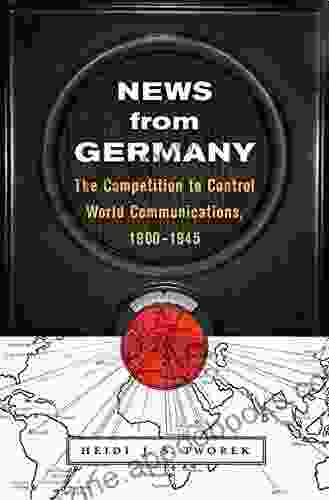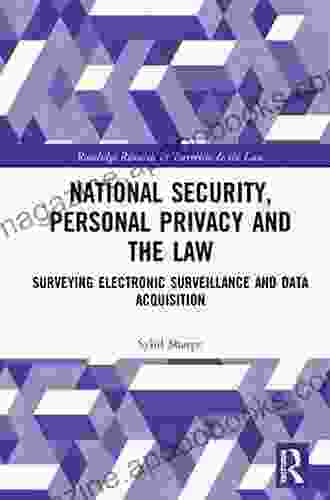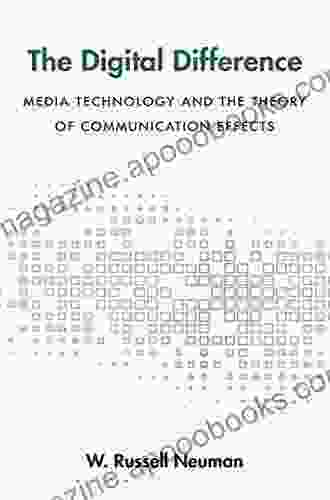The Competition to Control World Communications, 1900-1945: A Historical Examination

The development of world communications technology has had a profound impact on the course of human history. From the invention of the telegraph in the 1840s to the launch of the first satellite in 1957, new technologies have made it possible to communicate across vast distances and with increasing speed and efficiency.
4.4 out of 5
| Language | : | English |
| File size | : | 24857 KB |
| Text-to-Speech | : | Enabled |
| Screen Reader | : | Supported |
| Enhanced typesetting | : | Enabled |
| Word Wise | : | Enabled |
| Print length | : | 334 pages |
The control of world communications has been a source of competition between various entities for nearly as long as the technology itself has existed. Governments, corporations, and individuals have all sought to gain control of communications networks in Free Download to advance their own interests.
The period from 1900 to 1945 was a particularly important time in the history of world communications. During this period, new technologies such as the telephone, radio, and television were developed and widely adopted. These technologies had a major impact on the way that people communicated with each other and with the world around them.
At the same time, the period from 1900 to 1945 was also a time of great conflict and upheaval. The First World War and the Second World War both had a significant impact on the development and use of world communications technology.
The Early Years
The early years of world communications were characterized by competition between various countries to establish their own telegraph networks. The first telegraph line was built in England in 1837, and by the end of the 19th century, telegraph networks had been established in most of the major countries of the world.
The control of these telegraph networks was often a matter of national pride. Governments saw control of the telegraph as a way to assert their power and influence in the world.
In addition to governments, private companies also played a major role in the development of world communications. Companies such as Western Union and Marconi Wireless Telegraph Company built and operated telegraph networks around the world.
The competition between governments and private companies for control of world communications led to a number of conflicts. In the United States, for example, the government and Western Union fought a long battle over control of the telegraph network.
The Rise of Radio
The invention of the radio in the late 19th century had a major impact on the development of world communications. Radio made it possible to communicate across vast distances without the need for wires or cables.
The early days of radio were characterized by a great deal of experimentation. Individuals and companies from all over the world built and operated radio stations. There was little regulation of the radio spectrum, and stations often interfered with each other.
As the technology of radio improved, governments began to take a more active role in regulating the use of the radio spectrum. In the United States, the Federal Communications Commission (FCC) was established in 1934 to regulate radio broadcasting.
The FCC's regulations had a major impact on the development of radio broadcasting in the United States. The FCC assigned licenses to broadcasters and set standards for the content of broadcasts.
World War I and World War II
The First World War and the Second World War had a significant impact on the development and use of world communications technology. During both wars, governments used communications technology to coordinate their military operations and to spread propaganda.
The First World War saw the widespread use of radio for military communications. Radio allowed commanders to communicate with their troops in the field and to coordinate attacks.
The Second World War saw the development of even more sophisticated communications technologies. Radar was used to detect enemy aircraft and ships, and sonar was used to detect submarines.
The war also saw the development of new methods of propaganda. Governments used radio and other media to spread propaganda that was designed to boost morale and to demonize the enemy.
The Post-War Era
The post-war era was a time of rapid growth in world communications. The development of new technologies such as the satellite and the computer led to a revolution in the way that people communicated with each other.
The satellite made it possible to communicate across vast distances without the need for cables or wires. The computer made it possible to store and process large amounts of information, which led to the development of new forms of communication such as email and the World Wide Web.
The growth of world communications technology has had a profound impact on the way that people live and work. It has made it possible to communicate with people all over the world instantly and to access information from anywhere in the world.
The competition to control world communications has been a major force in the history of technology. From the early days of the telegraph to the modern era of the internet, governments, corporations, and individuals have all sought to gain control of communications networks in Free Download to advance their own interests.
The development of world communications technology has had a profound impact on the course of human history. It has made it possible to communicate across vast distances and with increasing speed and efficiency. It has also led to the development of new forms of communication such as email and the World Wide Web.
The competition to control world communications is likely to continue for many years to come. As new technologies emerge, new entities will seek to gain control of these technologies in Free Download to advance their own interests.
4.4 out of 5
| Language | : | English |
| File size | : | 24857 KB |
| Text-to-Speech | : | Enabled |
| Screen Reader | : | Supported |
| Enhanced typesetting | : | Enabled |
| Word Wise | : | Enabled |
| Print length | : | 334 pages |
Do you want to contribute by writing guest posts on this blog?
Please contact us and send us a resume of previous articles that you have written.
 Book
Book Novel
Novel Page
Page Chapter
Chapter Text
Text Story
Story Genre
Genre Reader
Reader Library
Library Paperback
Paperback E-book
E-book Magazine
Magazine Newspaper
Newspaper Paragraph
Paragraph Sentence
Sentence Bookmark
Bookmark Shelf
Shelf Glossary
Glossary Bibliography
Bibliography Foreword
Foreword Preface
Preface Synopsis
Synopsis Annotation
Annotation Footnote
Footnote Manuscript
Manuscript Scroll
Scroll Codex
Codex Tome
Tome Bestseller
Bestseller Classics
Classics Library card
Library card Narrative
Narrative Biography
Biography Autobiography
Autobiography Memoir
Memoir Reference
Reference Encyclopedia
Encyclopedia Susan May Warren
Susan May Warren Honey Phillips
Honey Phillips J R Tomlin
J R Tomlin Tony Robbins
Tony Robbins Ike Hamill
Ike Hamill Ingar Brunnett
Ingar Brunnett Pierre Clavel
Pierre Clavel Helen Ellis
Helen Ellis Rachel Rossano
Rachel Rossano Heidi Tinsman
Heidi Tinsman Shailesh Srivastava
Shailesh Srivastava Holly Lisle
Holly Lisle Indie Hayes
Indie Hayes Kim Adams
Kim Adams Nalo Hopkinson
Nalo Hopkinson Henrik Marstal
Henrik Marstal Hugues Duffau
Hugues Duffau Kelly Ripa
Kelly Ripa Hanya Yanagihara
Hanya Yanagihara Tarin Lex
Tarin Lex
Light bulbAdvertise smarter! Our strategic ad space ensures maximum exposure. Reserve your spot today!

 Bryson HayesUnlock the Joy of Music: Complete Mandolin Course for Beginners - Your Easy...
Bryson HayesUnlock the Joy of Music: Complete Mandolin Course for Beginners - Your Easy... Percy Bysshe ShelleyFollow ·19.8k
Percy Bysshe ShelleyFollow ·19.8k Ervin BellFollow ·11.4k
Ervin BellFollow ·11.4k George Bernard ShawFollow ·12.3k
George Bernard ShawFollow ·12.3k Harold BlairFollow ·9.9k
Harold BlairFollow ·9.9k Alan TurnerFollow ·7.8k
Alan TurnerFollow ·7.8k Nathaniel HawthorneFollow ·4.9k
Nathaniel HawthorneFollow ·4.9k Leo MitchellFollow ·9k
Leo MitchellFollow ·9k Steven HayesFollow ·8.4k
Steven HayesFollow ·8.4k

 Stanley Bell
Stanley BellUnlock the Secrets of Powerball Success: Master the...
Prepare to shatter the odds and transform...

 Ernest J. Gaines
Ernest J. GainesPatti Smith Horses 33 55: A Photographic Journey into a...
Journey into the raw and...

 Isaiah Price
Isaiah PriceMoyamoya Disease Diagnosis And Treatment: A Comprehensive...
Moyamoya Disease...

 Joseph Foster
Joseph FosterRecent Advances in Ophthalmology, Volume 14
Editor: [Editor's...
4.4 out of 5
| Language | : | English |
| File size | : | 24857 KB |
| Text-to-Speech | : | Enabled |
| Screen Reader | : | Supported |
| Enhanced typesetting | : | Enabled |
| Word Wise | : | Enabled |
| Print length | : | 334 pages |














